July 4, 2025
Air Date: July 4, 2025
FULL SHOW
SEGMENTS
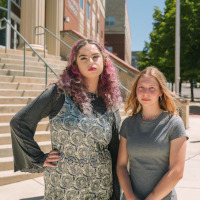
Trump Faces Youth Climate Lawsuit
View the page for this story
19-year-old Eva Lighthiser has experienced climate anxiety for most of her life, as her home state of Montana faces worsening floods, wildfires, and extreme heat. Now she and 20 other young people are suing the Trump administration over its efforts to boost fossil fuels while suppressing climate science and renewable energy. Eva Lighthiser, the lead plaintiff in Lighthiser v. Trump, joins Host Jenni Doering to share why she is pushing back against policies she believes are harming her future. (09:19)
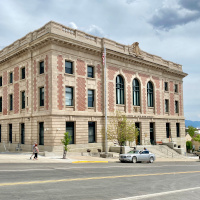
Youth Claim Climate Damage by Trump
View the page for this story
The new youth climate lawsuit Lighthiser v. Trump is ambitious as it targets specific executive orders and agency actions of the Trump administration. Vermont Law and Graduate School emeritus professor Pat Parenteau offers his views of Lighthiser v. Trump to Host Jenni Doering and explains why he thinks it may have a better chance of making it to trial than the pioneering Juliana youth climate case filed in 2015 which was ultimately blocked by the US Supreme Court before any trial. (12:20)
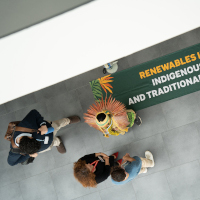
Tempered Hope for COP30
View the page for this story
Ten years since nations adopted the historic Paris Agreement, greenhouse gas emissions continue to rise, and hopes are dimming that we can meet the Paris goal of limiting global heating to 1.5 degrees Celsius. As global leaders prepare to meet in Brazil for COP30, some say the entire UN climate agreement system is broken. Preliminary sessions recently took place in Bonn, Germany where longtime UN climate observer and Senior Associate at E3G Alden Meyer was in attendance, and he joins Host Aynsley O’Neill. (11:06)
"Sight": Caribbean Reef Shark
View the page for this story
Living on Earth’s Explorer in Residence Mark Seth Lender has photographed animals all over the world, including under the sea. He shared this observation from a dive in the Bahamas where he was photographing Caribbean reef sharks. (02:56)
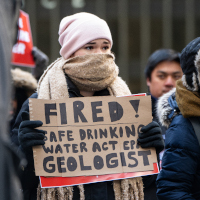
EPA Employees Speak Out
View the page for this story
In a rare act of public criticism, hundreds of EPA employees published a declaration of dissent from the agency’s policies under the Trump administration, calling out its alleged ignoring of scientific consensus to benefit polluters, undermining of public trust and more. David Cash led EPA’s Region One covering New England under the Biden Administration and shares his thoughts and opinions about the letter and the Trump EPA with Host Aynsley O’Neill. (10:30)
Show Credits and Funders
Show Transcript
250704 Transcript
HOSTS: Jenni Doering, Aynsley O’Neill
GUESTS: David Cash, Eva Lighthiser, Alden Meyer, Pat Parenteau
REPORTERS: Mark Seth Lender
[THEME]
DOERING: From PRX – this is Living on Earth.
[THEME]
DOERING: I’m Jenni Doering.
O’NEILL: And I’m Aynsley O’Neill.
Twenty-two youth plaintiffs say the Trump Administration is threatening their rights to life and liberty.
LIGHTHISER: I have always kind of experienced climate anxiety. I think ever since I was pretty young I’ve been aware of climate change. And I have experienced a plethora of, you know, different flooding events, wildfire smoke. Each summer it’s kind of a new animal.
DOERING: Also, EPA scientists blow the whistle on what they say is a dangerous new direction for the agency.
CASH: There should be a big red flag that hundreds of federal employees who normally are not political, happy to work for Republican and Democrats are saying there's something fundamentally wrong with how this agency is being run.
DOERING: That and more, this week on Living on Earth. Stick around!
[NEWSBREAK MUSIC: Boards Of Canada “Zoetrope” from “In A Beautiful Place Out In The Country” (Warp Records 2000)]
[THEME]
Trump Faces Youth Climate Lawsuit
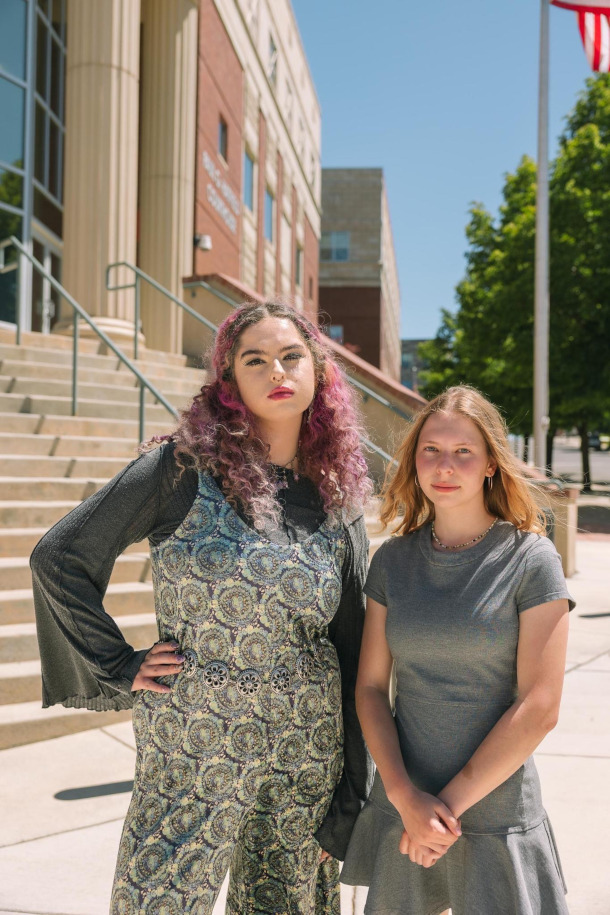
Eva Lighthiser (right) alongside another co-plaintiff in the case, Olivia Vesovich (left). (Photo: Courtesy of Our Children's Trust)
O’NEILL: From PRX and the Jennifer and Ted Stanley Studios at the University of Massachusetts, Boston, this is Living on Earth. I’m Aynsley O’Neill.
DOERING: And I’m Jenni Doering.
As climate policies are being rolled back by the Trump Administration and the U.S. Congress, young people are once again seeking the help of the third branch of our federal government in securing a safe, livable future. Almost ten years ago, the first major youth climate case, Juliana versus United States, was filed by the nonprofit Our Children’s Trust on behalf of 21 young people. It kicked off a protracted battle over whether the plaintiffs had standing that ended just this spring when the U.S. Supreme Court declined to let the case go to trial. But as we’ve reported in recent months, other sets of youth plaintiffs represented by Our Children’s Trust attorneys have won significant victories in state courts. And the new federal youth climate case, Lighthiser v. Trump, takes a different approach than Juliana. The executive order blitz from President Trump, and subsequent agency directives at EPA, the Departments of Interior, Energy, Commerce and more, have given this case much clearer targets. The plaintiffs say these executive orders and the resulting agency actions are actively harming them. Nineteen-year-old Eva Lighthiser is the lead plaintiff in Lighthiser v. Trump, and she joins us now from Livingston, Montana. Eva, welcome to Living on Earth!
LIGHTHISER: Thanks for having me.
DOERING: So tell us a little bit about yourself. What's your history with climate activism?
LIGHTHISER: I have been involved in climate litigation now for the past five years. I originally became a plaintiff on the lawsuit Held v. Montana, which went to trial and then subsequently was appealed to the Montana Supreme Court and won, and I have a deep history in Montana, having lived in Livingston most of my life and enjoying everything my surroundings have to offer.
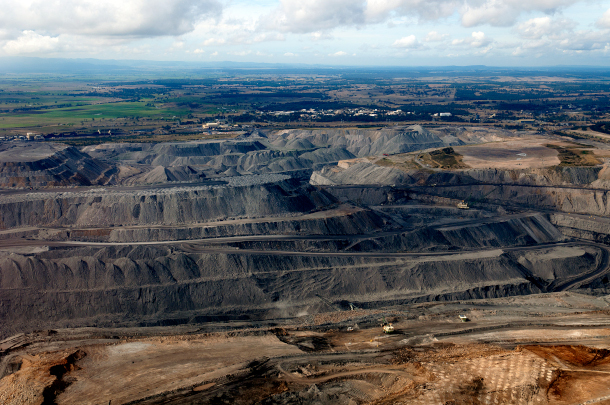
Part of the youth plaintiff’s case against President Trump regards his administration’s support of coal as an energy source. When coal is burned for energy, it releases high levels of carbon emissions and deadly air pollutants. (Photo: Max Phillips, Wikimedia Commons, CC BY 2.0)
DOERING: Eva, how have you personally felt the effects of environmental degradation and the climate crisis?
LIGHTHISER: I have experienced a plethora of, you know, different flooding events, wildfire smoke, each summer it's' kind of a new animal. Having every summer be smoke filled and, you know, experiencing just all the side effects of having your lungs be filled with smoke all day. You know, you've got a sore throat, a runny nose, congestion, and sometimes it's not super safe to exert yourself outdoors. Also, just seeing impacts on my community is really hard for me to see. During the flood on the Yellowstone River in 2022 we had a friend who lost both her home and business to the flood, and that is so detrimental. It's incredibly frightening to think that something like that could happen much more frequently and at a much larger scale. When I was 12, I lived outside of town a ways, and I had to cross a bridge in order to get into the city and that bridge was condemned and destroyed, and they put a temporary bridge in place while a new one was, you know, supposed to be built, but that bridge was washed away in a flooding event, and we had to drive all the ways into the neighboring county in order to get back into town, and that was a factor in us moving away from that house, just because of the uncertainty that came with flooding events.
DOERING: You mentioned being involved in the Held v. Montana case, which won this kind of landmark victory which found that, indeed, there is a right to a healthful environment in the Montana constitution and that includes preventing climate impacts. How does that contrast with what you're seeing out of the federal government at this moment?
LIGHTHISER: I think it contrasts a lot. You know, having won in that court was an incredible victory, but seeing what's happening at the federal level is extremely distressing. We're challenging three executive orders of which promote the further unleashing of fossil fuels, suppress climate science and suppress renewable energy and that is exactly the opposite direction that we need to be going.
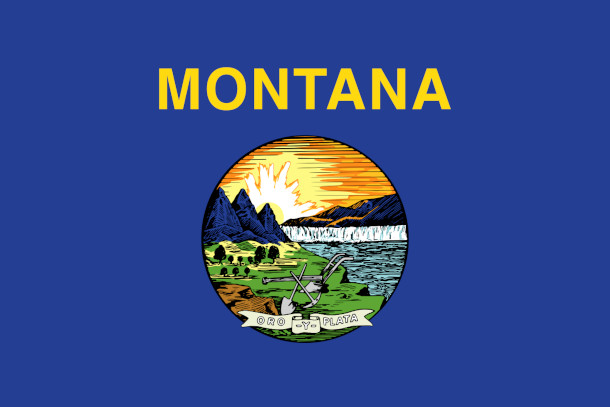
The Montana State Constitution says that citizens have the right to a clean environment. In the landmark case, Held v. Montana, the Montana Supreme Court ruled that this meant that the state government could not ignore environmental factors when permitting fossil fuel operations. (Photo: Enzwell, Wikimedia Commons, CC BY-SA 4.0)
DOERING: So Eva, you're suing the President of the United States as well as members of his cabinet. What does it feel like to be challenging such powerful entities and you know, as somebody who's only just entered adulthood?
LIGHTHISER: It's both intimidating but also incredibly invigorating. As young people whose voices are kind of underrepresented, you know, in the federal government, I think it feels incredibly powerful to be able to do this, to be able to speak up and use our voices.
DOERING: And tell me more about the executive orders and agency actions that this complaint, this lawsuit, is targeting. Which ones are you focusing on here?
LIGHTHISER: So we're focusing on an executive order that's, it's called, you know, Unleashing Fossil Fuels, that's kind of an abbreviated name for it, there's one that's, it's like Declaring a National Emergency, and then there's one that's Reinvigorating America's Beautiful Energy System. And all of these, you know, the different government agencies that are carrying out these executive orders are also in violation of the Constitution, because we are claiming that these executive orders are unconstitutional under the Fifth Amendment, which entails us the right to life and liberty because they are actively harming us as young people in the US.
DOERING: One of the things that President Trump has been focusing on in his second administration is trying to bring back coal fired power, and I understand that this is affecting Montana. What's going on there?
LIGHTHISER: You know, as somebody who lives in a railroad town, I see dozens of trains go through each day and a lot of them are carrying coal and transporting it from the Spring Creek Mine in Montana to coal strip, which is one of the most polluting plants in the country. And that's worrying in so many ways. But, you know, living here in a railroad town, it's concerning to see that coal dust, you know, blowing over town whenever the trains come through and understanding that there's going to be environmental and health implications because of that. And it's entirely within our power to start converting to renewable energy systems and it's very, very reductive to expand the mining of coal and the burning of it.
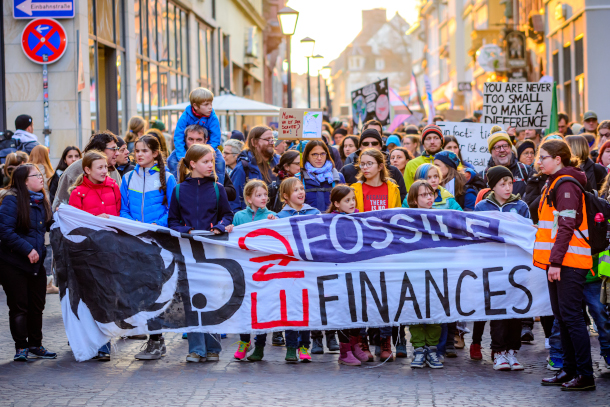
Lighthiser and her co-plaintiffs are illustrative of an international youth movement to protect their futures from the climate crisis. (Photo: Stephan Sprinz, Wikimedia Commons, CC BY 4.0)
DOERING: From your perspective, how important is access to a healthy environment to live in?
LIGHTHISER: I think it's absolutely crucial. We are, you know, US citizens, and here in Montana, in our Constitution, it states that we have the inalienable right to a clean and healthful environment. So I believe it is absolutely crucial that we continue to have a healthy environment going forward as well. You know, as a young person, I'm incredibly uncertain about my future and about our collective futures. Right now, it's a very scary time.
DOERING: Speaking of uncertainty and anxiety, we hear a lot about climate anxiety, especially among young people these days. How has that affected you personally?
LIGHTHISER: I've always kind of experienced climate anxiety. I think, ever since I was pretty young, I've been aware of climate change. And you know, as I've gotten older and continued to see more and more of it around me, it has been incredibly depressing, and it makes me really, really anxious to think about my future. And it is, it's something that's on my mind all the time.

Eva Lighthiser is a key plaintiff in the case Lighthiser v. Trump, which alleges that President Trump violates the constitution by increasing the use of fossil fuels and thereby endangering the life and liberty of young people who will face the increasing impacts of the climate crisis. (Photo: Courtesy of Eva Lighthiser)
DOERING: What kind of response have you received so far from members of your community once they've heard about this new lawsuit?
LIGHTHISER: You know, so far, I've been very fortunate to hear nothing but really supportive messages from people. I think a lot of people are really excited about this. When they hear that young people are taking on the government, I think it really is inspiring to everybody. So far, I have been really lucky, and I've heard mostly only positives, of course, you know, ignoring comment sections on social media, and the usual thing, it's something that I've been doing for a while anyways, so I just tend to kind of avoid that for my own sake.
DOERING: I know it's been, actually several years already since you started being involved in the Held v. Montana case, this case Lighthizer v. Trump could potentially last years and years. What have you learned since starting this all those years ago, and what do you hope for in the years ahead?
LIGHTHISER: I think something that I've learned is that litigation takes time, but you know, I'm prepared to be a part of it moving forward, and I'm aware that it does take time, and I'm concerned about the state of our current administration, and I will be for the next four years. By implementing these executive orders, our president is harming us but we are doing something about it. We are using our voices, and we are speaking up, and we are going to challenge that, and we aren't going to quit. I'm confident that, you know, if we stay in this fight, progress will happen.
DOERING: Eva, Lighthizer is one of the youth plaintiffs in Lighthizer v. Trump. Thank you so much, Eva.
LIGHTHISER: Thank you so much for having me.
Related links:
- Learn more about Our Children’s Trust, the firm representing Eva Lighthiser and the other plaintiffs.
- Listen to our story about Held v. Montana, the landmark state court case that preceded this one.
- Read an article from our media partner, Inside Climate News, about Lighthiser v. Trump
[MUSIC: Martin Klenn, “Coyote Wedding” on Coyote Sundance, Epidemic Sound]
DOERING: Just ahead, we’ll take a deeper look at the legalities of the Lighthiser v. Trump youth climate case. Stay tuned to Living on Earth.
ANNOUNCER: Support for Living on Earth comes from the estate of Rosamund Stone
Zander - celebrated painter, environmentalist, and author of The Art of Possibility - who inspired others to see the profound interconnectedness of all living things, and to act with courage and creativity on behalf of our planet. Support also comes from Sailors for the Sea and Oceana. Helping boaters race clean, sail green and protect the seas they love. More information @sailorsforthesea.org.
[CUTAWAY MUSIC: Martin Klenn, “Coyote Wedding” on Coyote Sundance, Epidemic Sound]
Youth Claim Climate Damage by Trump
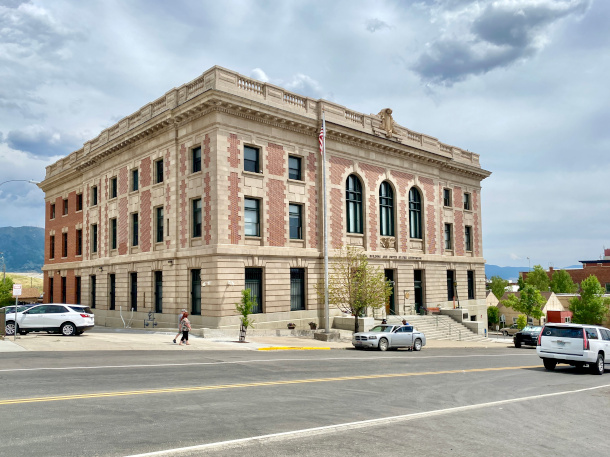
The Mike Mansfield Federal Building and United States Courthouse in Butte, Montana, the district where Lighthiser v. Trump was filed. (Photo: Warren LeMay, Flickr, CC BY-SA 2.0)
O’NEILL: It’s Living on Earth, I’m Aynsley O’Neill.
DOERING: And I’m Jenni Doering.
The landmark youth climate case, Juliana v. United States, got bogged down in the courts over whether the plaintiffs even had standing to sue the federal government over its decades-long practice of promoting fossil fuel development. But in the new lawsuit Lighthiser v. Trump, youth plaintiffs like Eva Lighthiser are hoping they can take the crucial step the Juliana case never could and make it to a trial on the merits. A ruling in their favor is the ultimate goal of course, but there are other wins for the climate movement they could notch along the way. During pretrial discovery and the trial itself, representatives for the government would be required to submit documentation and give testimony in depositions and on the witness stand. The Trump administration would be pressed to provide factual testimony, not political spin, and with a steep penalty for perjury, any lies or misleading statements about how fossil fuels contribute to the climate crisis would be risky. Whether or not Lighthiser v. Trump does in fact make it to trial, the case is sure to take a long time to wind its way through the court system. So, in the meantime, the plaintiffs have filed a motion for a preliminary injunction, asking the court to temporarily halt the executive orders and agency actions while the merits of the case are being considered. To help us understand Lighthiser v. Trump, we’re joined by Vermont Law and Graduate School emeritus professor Pat Parenteau. Pat, good to have you back on Living on Earth!
PARENTEAU: Thanks, Jenni, it's a pleasure to be with you.

EPA Administrator Lee Zeldin (left) and President Donald Trump (right). In President Trump’s second term, he has ordered various government agencies to make a number of environmental rollbacks. The youth plaintiffs and their attorneys will be making a case against both Trump and several of his agency heads. (Photo: Shaleah Craighead, Wikimedia Commons, Public Domain)
DOERING: So Pat, what are the legal arguments here in this case, Lighthiser v. Trump?
PARENTEAU: So it's a mix of constitutional claims and statutory claims based on statutes. The Constitutional claims are a right to life and liberty. And by right to life, the plaintiffs are saying it's not just any life, right? It's a healthy life, a right to live in a healthy environment where your future is secure, where your opportunities are available to you to grow and prosper, be happy, even. So, their concept of right to life and liberty is very, very broad, broader than anything the United States Supreme Court has ever recognized. That's the biggest reach of this case, okay? So it's very unlikely that there are five votes on this Supreme Court to recognize that kind of sweeping constitutional right. I applaud the plaintiffs for trying. I think the facts justify recognition of a right like that. I think the science supports what they're claiming as interfering with their right to life and liberty. That's a big reach. The one that intrigues me the most, and there's a sort of a series of claims around this one, is that the President doesn't have the authority to do what he's doing. And we've seen this in other contexts, whether it's deportation, whether it's birthright citizenship. He is an imperial president. Some call him a would-be king. And so one of the thrusts of the Lighthiser case is to say, Trump just doesn't have the authority he's claiming. And so that's what we call ultra vires. You know, that's where an agency, or in this case, the President is simply claiming authority he doesn't have. Presidents have two sources of authority. One is where Congress has passed a law, the Clean Air Act, the Clean Water Act, et cetera, and given to the president both specific authority and specific direction. The other source of authority is less clear, and that's the inherent authority of a president over things like foreign affairs and you know, declaration of emergencies that you know, the President does and has, of course, used repeatedly the power to declare emergencies in response to the disasters, right, that climate change is creating. So the President, in defending against this lawsuit is certainly going to invoke that source of authority. For example, he says there's an energy emergency. By every measure, there is no energy emergency. We are the world's largest producer, exporter of oil and gas in the world, right? In fact, it's hard to actually get companies to bid on some of the oil and gas leases, there's so much oil and gas in the system. So there really is no energy emergency, and if there was, why would you not fund and accelerate renewable energy? Solar energy is the cheapest form of electricity in the country, but his orders either say nothing about renewable energy, or actively are opposing renewable energy through tax credits, through funding and loans and loan guarantees and a whole variety of policies that the Biden administration put in effect. The Trump administration is canceling all of them, and I mean, literally all of them, right? So that's the situation we have with the President asserting these authorities. I think the strongest arguments in this case are going to be challenging his legal authority to do this. Challenging these orders as unconstitutional is a much harder case to make.
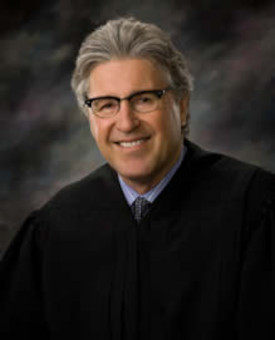
Judge Dana L. Christensen, the U.S. district judge assigned to Lighthiser v. Trump. (Photo: United States District Court for the District of Montana, Wikimedia Commons, public domain)
DOERING: It's taken a lot of work, but there have been a few wins for youth climate lawsuits in the past few years, the Montana ruling that Montanans have a constitutional right to a safe climate. There was also that Hawaii lawsuit that resulted in the State Department of Transportation fast tracking greener transit options. So what do you think are the chances that these kids will get anywhere in this lawsuit?
PARENTEAU: I think they are going to accomplish something. They're in front of a very good judge, Judge Christensen in Montana. He is a very smart judge, and he has written some very strong environmental opinions. He's going to be cautious and careful about this one, because it's big, and he knows he's going to be appealed, and it's going to go to the ninth circuit, and then it's probably going to end up in the United States Supreme Court. At least there will be an attempt, depending on who wins and loses in this case, there’s going to be an attempt by somebody to get this in front of the United States Supreme Court, but they've got a good judge to start with, and if they can put on a case that identifies a really egregious individual action of these agencies. I wouldn't go after a kitchen sink approach. I would be more targeted, more strategic, more specific about which of the actions that you're going after can you show are really causing the injuries that the youth plaintiffs are talking about, right? So connecting those individual facts to individual actions, convincing the court that these are really serious problems, serious infringement. These actions can be proven as increasing damage, increasing injury to the plaintiffs. That's the kind of argument that's going to win. But this whole idea that you can get a wholesale order from the court striking down all of these executive orders, blocking all of the actions that are being taken to implement them, that may be too far for the courts to deal with. So more strategic, more focus, they have a chance of actually accomplishing something really significant.
DOERING: Pat, there were some facts that were established in the Montana case that was upheld by the courts. To what extent do those facts that have been established in the courts potentially help this case as it moves along?
PARENTEAU: Well, that's a blueprint. The Held case is a blueprint for the kind of case that you want to put on. The difference is that the Montana Attorney General didn't try to contest any of the facts. They let them all come into evidence, much to their chagrin later on, when the case was upheld by the Montana Supreme Court. The findings of Judge Seeley in the trial court were all upheld. There was over 200 of those kinds of findings. So those findings don't automatically transfer to the federal case, but the plaintiffs now know exactly what kind of case to put on, which experts to call. By the way, one of the breakthroughs in the Held case was the recognition that these impacts on these individual plaintiffs, the heat that they have to contest with and so forth. You know, there was medical testimony that those impacts were not only doing physical harm to the plaintiffs, but psychological harm, that was accepted and recognized in the judge's findings and accepted by the Montana Supreme Court. So I have no doubt that Our Children's Trust lawyers know exactly how to litigate this case, and they will get that kind of evidence in front of Judge Christiansen, and it'll depend on what the judge does, but there's a really good chance that a really strong factual record, an evidentiary record can be built in this case, and that will follow the case all the way up the line as it goes to the circuit court and ultimately, maybe the Supreme Court. So it's critical, obviously, that in the trial, you do everything you can to build the strongest record that you can. I'm sure Our Children's Trust lawyers are going to do that.
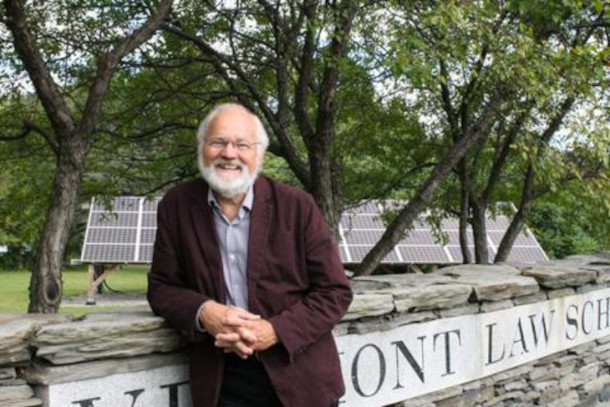
Pat Parenteau is a professor at Vermont Law and Graduate School. (Photo: Vermont Law and Graduate School)
DOERING: So Pat, what happens next?
PARENTEAU: Right. So now we're in the early stages of the case. It was just filed in May. And for sure, the government is going to try to dismiss it. They're going to make some of the same arguments they did against Juliana. They're going to argue they don't have standing. They're going to argue the courts don't have authority to review this material. They're going to argue that the President's decision that something is an emergency is not reviewable by the courts at all. So they're going to make all kinds of jurisdictional, as we call it, arguments to throw the case out, and they'll fight like the devil to get the case thrown out. I don't think they will, maybe they'll get it narrowed. I wouldn't be surprised that maybe the judge, as a first move, narrows the case a little bit, or at least says we're going to try these issues to start with, and then we'll see where we go from there. Break it down, because it's a little bit overwhelming when you look at it, to try to do it all at once. So there's going to be a skirmishing over whether there is going to be a trial at all, or whether we at least advance the case to where you're actually making arguments on what we call the merits, right, on whether there is a constitutional right, whether the President does have authority to issue these orders. One other that I didn't mention, I should probably quickly mention, they've argued something called the state-created danger doctrine. This is a doctrine that says, when the government is taking affirmative action that endangers individual lives or well-being, that that can be the source of an argument or a claim against the government. The United States Supreme Court has never recognized this so-called state- created danger doctrine. Some of the circuits have recognized it in different ways. Other circuit U.S., Courts of Appeal, elect, the Fifth Circuit have said there is no such thing. So that's one that's also kind of on the bubble, I think. But I like it because, in a way, it absolutely captures what I would call the gestalt of this case, which is, it's all about danger, right? And it's all about making the danger worse. The danger is incredibly severe, existential even. But the idea that what the government is doing is it knowingly, deliberately putting these young people's lives in danger, that's really powerful. Even if it doesn't result in a sweeping legal victory, it's the kind of argument that sort of captures the essence of what this case is about. So that's what we're going to see as this case moves forward. How many of these claims remain, how many may be dismissed? And as I said, however the initial decision comes out, it will be appealed. If the plaintiffs lose, they will appeal. If the government loses, you can be sure the government will appeal. So whatever happens in Montana, won't stay in Montana. It's going to the ninth circuit, and from there, it's probably going to the Supreme Court.
DOERING: Pat Parenteau is a former EPA Regional Council and emeritus professor at Vermont Law and Graduate School. Thank you so much for joining us, Pat.
PARENTEAU: Thanks, Jenni, good to be with you.
Related links:
- Read more on Lighthiser v. Trump at Our Children’s Trust.
- Listen to Pat Parenteau’s discussion on Held v. Montana with Living on Earth host Steve Curwood here.
[MUSIC: Harold López-Nussa, “Hope” on Timba a la Americana, UMG Recordings, Inc.]
Tempered Hope for COP30
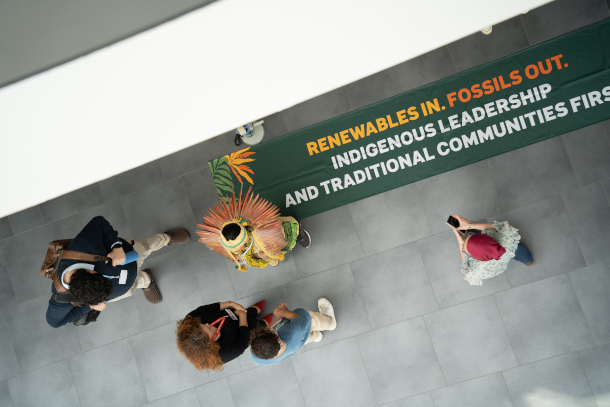
Climate negotiators met for two weeks of technical talks in the German city of Bonn, seeking to move forward on critical issues before COP30 in Brazil. (Photo: Lara Murillo, UN Climate Change, Flickr, CC BY NC SA 4.0)
O’NEILL: At the 2015 UN Climate Change Conference, nearly 200 nations pledged to limit global heating to 1.5 degrees Celsius above preindustrial levels, resulting in the historic Paris Agreement. Climate scientists have long warned that past those 1.5 degrees, humanity risks even more dangerous heatwaves, droughts, and sea level rise, as well as catastrophic tipping points such as the loss of massive ice sheets in Antarctica and Greenland. Now it’s been 10 years since Paris, and we are not on track to meet its crucial goals. Mitigation efforts to reduce the greenhouse gas emissions we are pumping into the atmosphere, as well as to support healthy ecosystems that can soak up some of these emissions, are not happening nearly fast enough. Meanwhile, adaptation efforts like flood defenses, early warning systems for cyclones and switching to drought-resistant crops, are also falling behind. As global leaders prepare to meet in Belem, Brazil this November for COP30, some say the entire UN climate agreement system is broken. Preliminary negotiations recently took place in Bonn, Germany where longtime UN climate observer and Senior Associate at E3G, Alden Meyer, was in attendance. He joins us now. Alden, welcome back to Living on Earth!
MEYER: Thanks, Aynsley, it's great to be with you again.
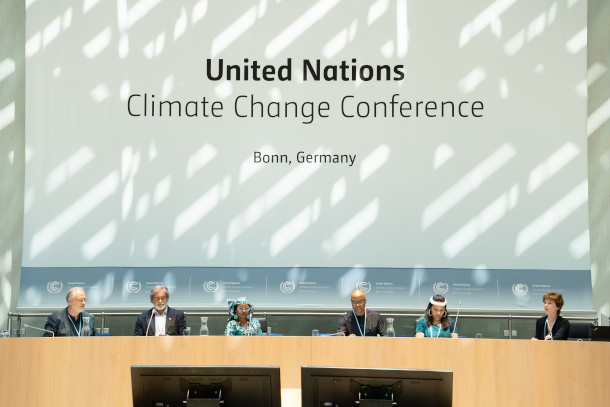
Over 5,000 government delegates and stakeholders gathered in Bonn, Germany for the Bonn Climate Change Conference that took place from June 16 - 26, 2025. (Photo: Lara Murillo, UN Climate Change, Flickr, CC BY NC SA 4.0)
O'NEILL: So Alden, what was the mood during these preliminary climate talks that took place in Bonn, Germany?
MEYER: Well, it was typical in the sense that they're pretty contentious talks. The issue of climate finance especially was present across all the negotiating rooms. There was a two-day agenda fight at the beginning of the meeting, which held up negotiations until Wednesday of the first week. But there was also, I think, seriousness of purpose. People got down to business. Once the negotiations started, they produced draft texts across most of the negotiation spaces. That doesn't mean they're in agreement. There's a lot of different options and a lot of divisions, but they did produce a product that can be built on, and the Brazilian incoming Presidency of COP 30 and Belem can use as a basis for work at the political level by ministers and leaders over the coming months to try to resolve some of those differences.
O'NEILL: You know, I think it's fair to say that even just in the first half of this year we have seen a series of climate catastrophes, fires in Canada, floods in Nigeria. So what was discussed at the Bonn talks in terms of adaptation, in terms of maybe finance and support?
MEYER: Well, one of the major issues under negotiation is what's called the global goal on adaptation, which is mandated to be decided in COP 30 and Belem, and they're trying to refine a list of indicators of how you measure progress in building up resilience and increasing the capability of, of countries to deal with these mounting climate impacts. One of the more contentious issues there was the provision of climate finance, particularly by developed countries. You may remember at the COP in Glasgow, four years ago, developed countries committed to try to double finance for adaptation investments by developing countries, from then 20 billion a year to $40 billion a year this year. There are some developing countries, the least developed countries are calling for a tripling of that amount to $120 billion a year by 2030. Of course, there was no agreement on that. In fact, predictions are now that the amount provided by developed countries may actually go down a little bit next year, compared to 2025. So this is a real issue that's going to have to be grappled with at the political level because I think if there's not progress on mobilizing more finance for adaptation and for loss and damage to go into the fund that was created at the COP in Sharm El Sheik a few years ago, it's going to weaken trust between developed and developing countries.
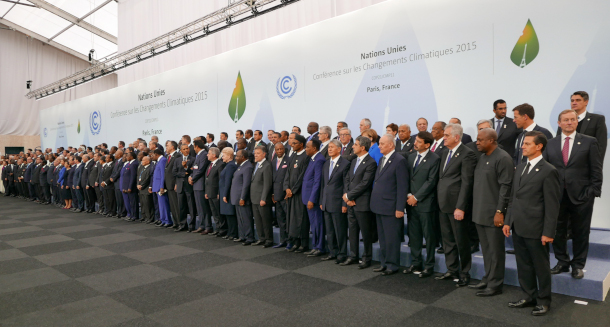
Heads of delegations at the 2015 United Nations Climate Change Conference (COP21), which led to the signing of the Paris Agreement. (Picture: Presidencia de la República Mexicana, Wikimedia Commons, CC BY 2.0)
O'NEILL: And United States negotiators were not present at Bonn. What impact did that absence have on the talks?
MEYER: Well, yeah, this is the first time in the over 30 years I've been following this process since it began before the Rio Earth Summit in 1992 where the United States was not represented at all in the process. Even during President Trump's first term, there were robust US delegations participating in the negotiations. It had a couple of impacts. First of all, I think at one level, other countries may have been a little relieved that the Trump administration was not represented at the political level because of the actions they've been taking in other multilateral forums across the world, but they did miss the professional civil service negotiating team that has tremendous expertise and skill in the negotiations and often was helping to try to find some ways to resolve differences and, and I heard that from a number of negotiators in Bonn that that absence was definitely felt. It had the impact that the European Union, for example, was now the frontline developed country delegation in terms of taking leadership on issues like climate finance, like trade and unilateral measures, like the mitigation negotiations and I think that was a little maybe unexpected or uncertain for them. They took a little while to find their sea legs, so to speak, and be able to step into that role. So it does have implications and of course, everyone's wondering, will the Trump administration again vacate the field at COP 30 in Belem, or will they send a political delegation from the administration and if they do, what will their objectives and behavior be? And no one really knows the answer to that question, maybe not even the Trump administration itself.
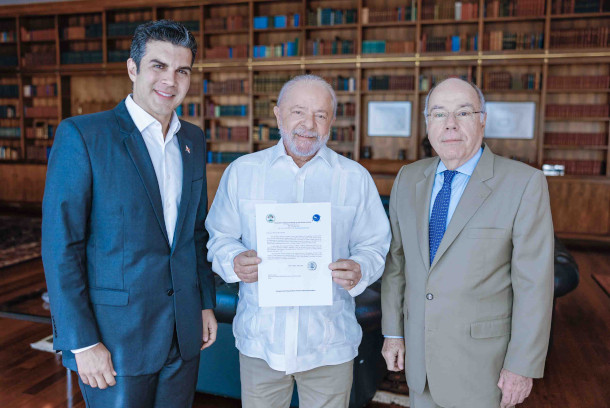
Brazilian Governor of the State of Pará, Helder Barbalho (left), President of the Republic, Luiz Inácio Lula da Silva (center), and Minister of State of the Ministry of Foreign Affairs, Mauro Vieira (right), announced the City of Belém, as the host city of COP 30. (Photo: Ricardo Stuckert, Wikimedia Commons, CC BY 2.0)
O'NEILL: And as I understand it, there have been talks about changing the UNFCCC process. Where does that conversation stand?
MEYER: Well, there are several levels of that. There are reforms within the current rules that are being discussed, things like increasing the effectiveness of participation, of observers, indigenous peoples, youth, civil society. There are discussions about ways to increase the transparency of attendance by the fossil fuel industry and others with potential conflict of interest. There are discussions about how to reform the efficiency of the process, streamline the agenda, reduce the number of technical negotiating items. There's also much bigger conversations that are happening, as we have now completed most of the negotiations over the rule book for the Paris Agreement, and we really need to shift into implementing what we've already agreed. And in that kind of world, the division between parties, the so called countries represented in this process, and observers, civil society, business investors, cities, states, etc, doesn't make a lot of sense. In the real world, all those actors are key to implementing the changes we need and so we need to also engineer a culture shift in the way this process operates to generate radical collaboration of the kind that we've seen among some of the sub national actors over the last decade or so, and create a culture of cooperation, collaboration, supporting each other, learning from experience, both good and bad, sharing those lessons, rather than finger pointing and zero sum bargaining, which characterizes the negotiation space. And I think Brazil is trying to do that with their presidency. They've called for a global mutirão which is based on an indigenous phrase in Brazil, which basically means everyone coming together to achieve big things, whether that spirit and culture will really permeate the talks in Belem, remains to be seen. That is a huge shift in mindset, especially with all the geopolitical tensions that we see now, the conflicts, the trade wars, the security concerns, the divisions between countries. That's a pretty big lift, but they are trying to infuse that mutirão spirit into the entire process.
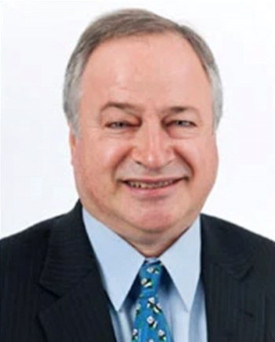
Alden Meyer is a Senior Associate at E3G working on US and international climate policy and politics. He is a Principal at Performance Partners, which provides a range of consulting services to clients in government, business, and the non-profit sector. (Photo: Courtesy of Alden Meyer)
O'NEILL: Alden, from your perspective, what needs to be done, not just at COP 30 later this year, but in these future climate talks for decades to come?
MEYER: Well, we're now at the 10th Anniversary of the agreement in Paris on the Paris Agreement, and Brazil is framing this in terms of a decade of implementation, forward to 2035. What happens after Bonn is lifting this up to the political level, the Leaders Summit that the Secretary General will convene in New York in September during the opening of the UN General Assembly, the Leaders Summit that Brazil intends to convene just before the COP opens in Belem in November, consultations with ministers to try to resolve some of the deadlock on key issues like climate finance and mitigation ambition and adaptation and loss and damage. The bigger issue, I think, is how this process can drive collaboration and ambition across a whole range of other spaces, whether it's the G20, the Clean Energy Ministerial, the IMF and the World Bank annual meetings, other spaces which are outside the formal climate process, but which need to be deeply engaged and involved if we're going to roll up our sleeves and really address this crisis. And that is where I think Brazil is driving with the action agenda, as well as with the roadmap to $1.3 trillion that they intend to put forward in Belem, because reaching those kind of goals is not something that climate negotiators can deliver on their own. It involves finance ministers, it involves leaders, it involves investors in the private sector, and everyone's got to come together to achieve that level of ambition. So hopefully we will come out of here with little more clarity about who needs to do what and how to pull it all together, but there will be a lot more work to do after COP 30 adjourns in Belem.
O'NEILL: Alden Meyer is a Senior Associate at E3G, working on US and international climate policy and politics. Alden, as always, thank you so much for taking the time with me today.
MEYER: I very much enjoyed it.
Related links:
- E3G | “E3G Media Briefing – Insights and Outcomes for Bonn as Key Milestone on Road to COP 30″
- Carbon Brief | “Bonn Climate Talks: Key Outcomes From the June 2025 UN Climate Conference”
- Learn more about Alden Meyer.
- Learn more about COP30.
[MUSIC: Paulo Lucas, “Pôr Do Sol” on Samba Rio, Paulo Lucas]
DOERING: Coming up, EPA career employees risk their jobs to speak out about Trump administration policies. Keep listening to Living on Earth.
ANNOUNCER: Support for Living on Earth comes from the Waverley Street Foundation, working to cultivate a healing planet with community-led programs for better food, healthy farmlands, and smarter building, energy and businesses.
[CUTAWAY MUSIC: Paulo Lucas, “Pôr Do Sol” on Samba Rio, Paulo Lucas]
"Sight": Caribbean Reef Shark
A shark eyes the camera. (Photo: © Mark Seth Lender)
O’NEILL: It’s Living on Earth, I’m Aynsley O’Neill.
DOERING: And I’m Jenni Doering.
Living on Earth’s Explorer in Residence Mark Seth Lender has photographed animals all over the world, including under the sea. And he shared this observation from a dive in the Bahamas where he was photographing Caribbean reef sharks.
Close Encounters of the Extraordinary Kind
Caribbean Reef Shark
Grand Bahama island
- II -
Sight
Standing on the ocean floor, how natural it all becomes. How quickly you forget, moment by moment, your air is running out. The only color that survives down here is blue. A soft milky blue. The only creatures that belong here can breathe, water as if it is air.
The impenetrable distance tapers to black.
Out of the airless deep out of the darkness come the sharks.
The camera housing in my hands, its round portal looking into the sea is clear, as glass; but from the outside it reflects. The sharks in that reflection find… another shark. These sharks know each other well. Each has her own physiognomy, different scars and shape. Different bodies, and manner. Instead in the curvature of the glass they see a shark they have never seen. One approaches her – and hits the glass! Another the same!
Something is in the way. Something is wrong.
The shark in the distance never reaches them nor they her. Whatever the usual response would be from this strange shark… is absent. There is no sign and countersign. No scent. No impulse of electricity coursing synapses, nor muscles firing as there should be.
No heartbeat.
The sharks swim in to look but stand off now, do not collide. Every one of them takes her turn. Again and again. Until, eventually they swim off.
Except for two.
These two, stay.
They slow down; their eyes move casting over the image there in the glass.
Shark laden waters in the Bahamas. (Photo: © Mark Seth Lender)
Once more one of them taps the reflection. As if to make sure.
Sure of what? What have the sharks seen? What does it mean to them? They evaluate this underwater world in a manner we cannot. They know, the stranger moves as they themselves move, matching their speed, towards or away precisely; and looks back at them, precisely, meeting their eyes with her own obscure and shining eyes exactly the same way.
What have the sharks seen? What can it be?
Have the sharks seen The Self?
DOERING: That’s Living on Earth’s Explorer in Residence, Mark Seth Lender.
Related links:
- Mark Seth Lender’s website.
- More on safety diver and shark expert, Cristina Zenato.
[MUSIC: George Benson, “Shark Bite – 2000 Remaster” on Breezin’, Warner Records Inc.]
EPA Employees Speak Out
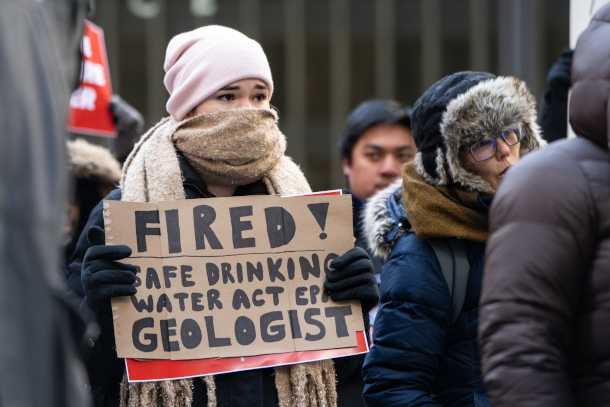
Federal workers and labor allies rallied at Federal Plaza in Chicago on February 18, 2025 to protest the termination of Chicago-based EPA workers and other federal employees. (Photo: Paul Gyotte, Flickr, CC BY 2.0)
O’NEILL: In a rare act of public criticism, EPA employees published a declaration of dissent from the agency’s policies under the Trump administration. Hundreds of employees signed the letter with many choosing to remain anonymous. David Cash led EPA’s Region One covering New England under the Biden Administration. And he’s here to share his thoughts and opinions about the letter. David Cash, welcome back to Living on Earth!
CASH: It's good to be here again. Thanks.
O'NEILL: So, David, it seems like a lot of EPA employees are risking their careers to write this letter. Why would they do that?
CASH: Yeah, this is an extraordinary effort being made by these staff for a lot of different reasons. One, as you mentioned, this puts a target on their back in terms of retribution from within the administration, and we know that this administration will not hesitate to use retribution. But the other reason that I would love for your audience to hear is that these are dedicated career civil servants who, regardless of administration, administer the laws like the Clean Air Act and the Clean Water Act guided by science and legal concerns, and they do it, regardless of what the politics are, they always are on the side of serving the American public. I've worked in government for a long time, and I cannot recall of a time when civil servants released a letter like this that put their jobs on the line and also called into question the actions of the administration that they work for. It shows an ultimate devotion to the public, because they're taking a lot of risks to raise an alarm and a very important alarm.
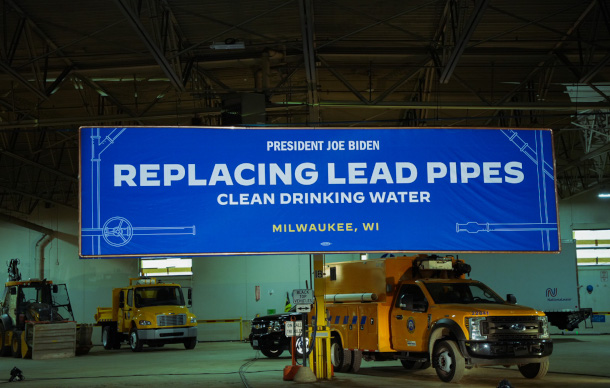
EPA employees signed a declaration of dissent in part highlighting their concern for the rollback of environmental rules and projects, like the Trump administration's attempt to rescind Biden-era lead regulations. (Photo: US EPA Gov, Wikimedia Commons, Public Domain)
O'NEILL: And David, I understand you've had the chance to speak with a number of EPA employees who did sign the document. What did they have to say?
CASH: Clearly, this was a really difficult choice for them to make. One of them who actually left recently, his job, by the way, was to literally fly into communities that had just experienced, say, a wildfire or a toxic spill, and help bring that community back to normalcy, help clean up, help rebuild. And he said, "I still believe in the stated mission of EPA, but I don't believe in the actions of the agency will actually support that mission." This person felt like they could not continue working for this agency because it was not fulfilling the fundamental mission. Just to demonstrate the courage, another staff member I spoke to said, "My signing this may result in a threat to my job, but I feel there's a greater existential threat to the environment, to my child growing up, that EPA will no longer offer the safety net to communities when some kind of environmental hazard happens." So, very difficult for these staff members to make this choice to sign such a letter, but the threat to what they hold dear, that is, protecting human health and the environment is just too great for them to not make this kind of statement.
O'NEILL: I imagine that sentiment is shared amongst many, if not all, of the employees who, who also signed their names onto that letter.
CASH: I imagine that's true, and I imagine it's also held by many, many, many other employees who were too nervous to sign for fear of retribution.
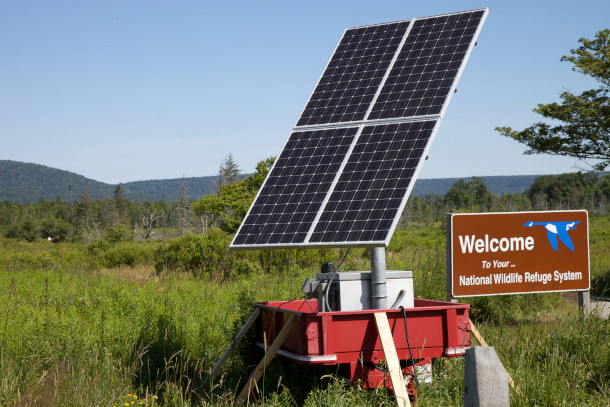
David Cash warns that the average American may begin to notice changes under Trump’s EPA, such as a decrease in tax breaks for electric vehicles and cuts to grants for solar panel installation. (Photo: USFWS/Rachel Molenda, Wikimedia Commons, Public Domain)
O'NEILL: And now the letter outlines five main concerns. I want to go through a couple of those point by point. So one involves ignoring scientific consensus to benefit polluters. What do they mean by that?
CASH: EPA is a scientific organization. It's woven throughout the laws that EPA has to implement. We need to understand how pollution happens, how it can be cleaned up, the kind of public health impacts pollution can have, whether a pollutant causes cancer or asthma. Those are the kinds of things that undergird EPA actions. It's science. It's a scientific organization, always has held itself up to the highest standards of scientific integrity. And through a variety of decisions that are being made, some of them unlawful, like the freezing of funds to go to a variety of different pollution reduction programs, we are seeing science being pushed aside. We've seen, for example, an effort being made to essentially say that fossil fuels don't have a significant impact on climate change and on communities. And I know that this program has focused on the endangerment finding, which, you know, 15 years ago, legally and scientifically, it was found that climate change endangers public health and the environment. So we see an abandonment of science in those kinds of ways. But we also see it in, you know, follow the money, in the request for a reduction and essential elimination of the Office of Research, which is designed to provide the scientific backbone of EPA. Many of these actions will benefit the fossil fuel industry and polluting chemical industries, lower costs for them, and therefore impose costs on everybody else, right? They're often touted as, these are cost saving efforts, but maybe they save cost bottom line for some companies, but who pays? People who now pay greater health costs because their mother has cancer, or the family that can't go to work one day because they have to take their kid to the hospital because they're having an asthma attack. Those are costs that the companies don't put on their books, right? But the more we see these rollbacks that are not based on science, that's how people are going to pay. So that's what they mean by that.
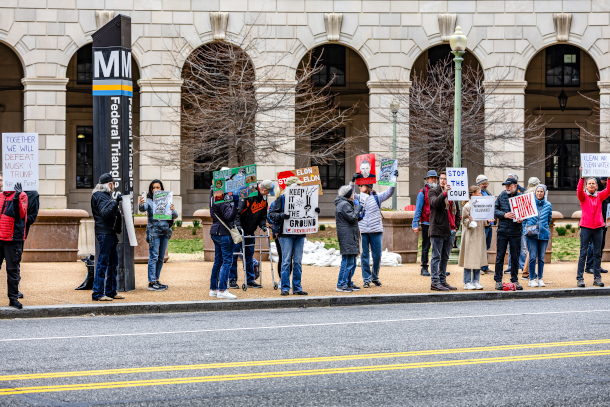
A group of protesters gathered in front of the EPA headquarters in DC voicing their concerns against the Department of Government Efficiency (DOGE). (Photo: Jason Gooljar, Flickr, CC BY NC SA 2.0)
O'NEILL: And one of the points that stood out to me a lot, David, was this idea that the EPA has been undermining public trust. What do you make of that?
CASH: EPA is a large federal agency, and I think, as we all know, it's hard for a large federal agency to gain the trust of communities and people, and over many administrations, efforts are made to regain that trust, and whether that's in how we invest our funds, so that communities feel direct benefits. By making those investments, we improve trust. When we do a regulation, we try to make sure everybody has a voice at the table, and that the regulations will benefit communities and also not cost too much. We're always trying to balance economic impact. So by reducing those kinds of programs, communities and people and families are going to feel like the government has let them down, that they can't trust the government to protect them in the face of increasing environmental impacts, that the government is stepping back to protect them from climate change, that the government is stepping back to stop bringing green jobs, solar panels to their schools, electric school busses to their school yards, all of those kinds of things that's going to decrease trust. And here's what's even more insidious, a lot of the language that has come from this current administration is designed specifically to sow that mistrust. So there have been accusations, for example, of waste, fraud and abuse that have had no evidence behind them. They've gone to court time and time again, and they have presented no evidence that there's been waste, fraud and abuse. Just by that being out there, by people seeing that on Instagram, by them hearing the President say that, or the administrator of EPA saying that that's going to decrease their trust.
O'NEILL: You know, lots of our listeners will likely be following along with this story, but for the average person who might not be keeping up with the ins and outs of the Environmental Protection Agency, why do you think that the average citizen should care about this?
CASH: I think there are two big reasons. First, there should be a big red flag that hundreds of federal employees who normally are not political, happy to work for Republican and Democrats are saying there's something fundamentally wrong with how this agency is being run. The second would be for this person to say, whoa. As I'm learning more about this, I'm now going to worry more about whether my water is clean. I'm going to worry more about whether my air is clean. I'm going to be frustrated that I was hoping to buy an electric vehicle and get some support from the government in terms of an incentive or tax break, and they're taking that away from me. Oh, I did hear that my school district had won an EPA grant to get a solar panel on their roof, and that's being taken away. Oh, I was looking at a job at this new HVAC company that was going to install new kinds of technologies, and I'm not going to get that job anymore. That's what average Americans should be thinking when they hear this kind of news.
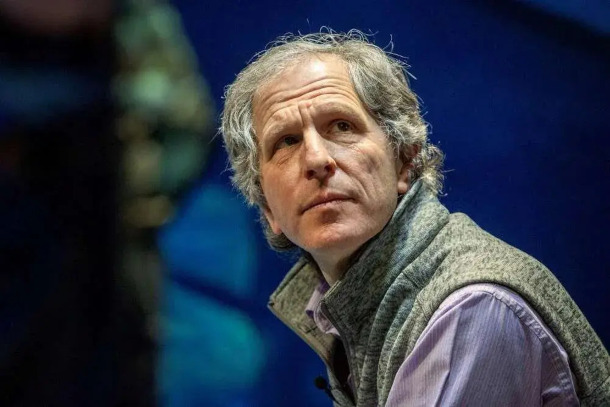
David Cash is the former Administrator of EPA's New England Region under Region 1. (Photo: Courtesy of David Cash)
O'NEILL: And I know that this letter has only just been released, but perhaps, what do you hope will come out of it?
CASH: Over the last six months, as we've seen rollbacks of regulation, as we've seen unlawful freezing of federal funds for grants, as we've seen the decimation of staff at these agencies. What I would hope is that with each thing, like a letter like this, or other ways that are being communicated to the American people, that the American people take a step back and really question how decisions are being made and work to assure that they will have clean water and clean air into the future, because these steps are going to result in the opposite of that.
O'NEILL: Dr. David Cash is the former EPA Administrator for Region One New England. Thank you so much as always, for joining us, Dr. Cash.
CASH: Thank you, Aynsley.
O’NEILL: After we spoke with David Cash, the EPA said it placed nearly 150 staffers who allegedly signed the letter on administrative leave, pending an investigation. EPA press secretary Brigit Hirsch said in a statement quoted by the Washington Post, “We have a ZERO tolerance policy for agency bureaucrats unlawfully undermining, sabotaging, and undercutting the agenda of this administration as voted for by the great people of this country last November.”
Related links:
- The Guardian | “EPA Employees Sign ‘Declaration of Dissent’ Over Agency Moves Under Trump”
- Read the EPA employees’ letter of dissent.
- WBUR | “Outgoing New England EPA Head Says Trump’s Environmental Agenda Is ‘Counter to the Values’ of U.S.”
[MUSIC: Hunter Quinn, “The Appalachian Trail” on Rambles, Epidemic Sound]
DOERING: Next week on Living on Earth, Environmental justice advocate Catherine Coleman Flowers on how disinvestment in poor, rural communities of color is leading to a sanitation crisis.
FLOWERS: So if you are living in a rural community, a lot of people are on on-site septic. And when they're on on-site septic, it is the homeowner's responsibility, in a lot of cases, to maintain it. What we found out initially, there were people that were straight piping, meaning that when they flushed their toilet, it goes straight out onto the ground. However, we also found when we did a house to house survey that people had paid for on-site septic and it wasn't working properly, meaning, when it doesn't work properly, it pushes the sewage back into their homes, comes back into a bathtub. It can come into a shower, it can just flood the home. We've seen that as well.
DOERING: That’s next week on Living on Earth.
[MUSIC: Hunter Quinn, “The Appalachian Trail” on Rambles, Epidemic Sound]
O’NEILL: Living on Earth is produced by the World Media Foundation. Our crew includes Naomi Arenberg, Paloma Beltran, Daniela Faría, Mehek Gagneja, Swayam Gagneja, Mark Kausch, Mark Seth Lender, Don Lyman, Ashanti Mclean, Nana Mohammed, Sophia Pandelidis, Frankie Pelletier, Jake Rego, Andrew Skerritt, Bella Smith, Melba Torres, and El Wilson.
DOERING: Tom Tiger engineered our show. Alison Lirish Dean composed our themes. Special thanks this week to safety diver and shark expert, Cristina Zenato. You can hear us anytime at L-O-E dot org, Apple Podcasts and YouTube Music, and like us please, on our Facebook page, Living on Earth. Find us on Instagram @livingonearthradio, and we always welcome your feedback at comments@loe.org. Steve Curwood is our Executive Producer. I’m Jenni Doering.
O’NEILL: And I’m Aynsley O’Neill. Thanks for listening!
ANNOUNCER: Funding for Living on Earth comes from you, our listeners, and from the University of Massachusetts, Boston, in association with its School for the Environment, developing the next generation of environmental leaders. And from the Grantham Foundation for the protection of the environment, supporting strategic communications and collaboration in solving the world’s most pressing environmental problems.
ANNOUNCER 2: PRX.
Living on Earth wants to hear from you!
Living on Earth
62 Calef Highway, Suite 212
Lee, NH 03861
Telephone: 617-287-4121
E-mail: comments@loe.org
Newsletter [Click here]
Donate to Living on Earth!
Living on Earth is an independent media program and relies entirely on contributions from listeners and institutions supporting public service. Please donate now to preserve an independent environmental voice.
NewsletterLiving on Earth offers a weekly delivery of the show's rundown to your mailbox. Sign up for our newsletter today!
 Sailors For The Sea: Be the change you want to sea.
Sailors For The Sea: Be the change you want to sea.
 The Grantham Foundation for the Protection of the Environment: Committed to protecting and improving the health of the global environment.
The Grantham Foundation for the Protection of the Environment: Committed to protecting and improving the health of the global environment.
 Contribute to Living on Earth and receive, as our gift to you, an archival print of one of Mark Seth Lender's extraordinary wildlife photographs. Follow the link to see Mark's current collection of photographs.
Contribute to Living on Earth and receive, as our gift to you, an archival print of one of Mark Seth Lender's extraordinary wildlife photographs. Follow the link to see Mark's current collection of photographs.
 Buy a signed copy of Mark Seth Lender's book Smeagull the Seagull & support Living on Earth
Buy a signed copy of Mark Seth Lender's book Smeagull the Seagull & support Living on Earth

